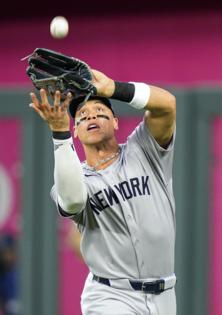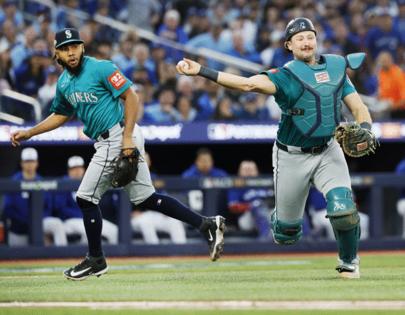Bill Madden: Making sense of why the AL MVP vote was so close
Published in Baseball
NEW YORK —The innate beauty of the Baseball Writers Association’s Most Valuable Player award — which sets it apart in terms of prestige from all the other sports awards — is that to this day, some 95 years after its adoption by both leagues, the debate rages on as to what exactly “most valuable” means. For instance, if it was simply the player of the year, with the best overall statistics, then why didn’t the BBWAA simply name it that?
After all, especially with all the advanced metrics introduced to the game over the last 20 years, it’s a whole lot easier task for the Baseball Writers to dismiss the word "valuable" from the process and just vote on the cold, hard stats. On the other hand, although there is no documentation for this, I suspect by naming the award “most valuable” the writers wanted to put the emphasis on “team” and “winning” rather than individual performance. Indeed, in the 95-year history of the award, 128 of 191 winners — 67% — have come from teams that finished first.
Which brings us now to Aaron Judge’s narrow (355-335) win over Mariners catcher Cal Raleigh for the American League MVP. There was no question that Judge, who led the league in batting (.331 to Raleigh’s .247), runs (137 to 110), on-base percentage, slugging, OPS (1.144 to .948) and total bases, was the American League Player of the Year. He had another season for the ages. His 53 homers were the most ever by a batting champion and he became the first player since the expansion era (1961) to lead the majors in batting, on-base percentage and slugging in the same season.
So why was the vote so close?
Here was where that ultimate intangible, “most valuable,” came into play. It’s been many, many years since I was an MVP voter, but when I was I tried to determine the player most valuable to his team’s winning and I automatically looked first to the final standings — and in particular the teams that finished in first place — as I began the process. For example, I always felt Andre Dawson, winning the 1987 NL MVP for a Cubs team that finished last was a bit of a joke. After all, how valuable could he be for a team that finished last?
Granted, Dawson did lead the NL in homers and RBIs that season, but the reason he won was because the 95-win NL East champion Cardinals had multiple MVP candidates and the writers split their votes between Ozzie Smith (who had nine first-place votes and finished second to Dawson) and Jack Clark, who had three first-place votes and finished third.
While Raleigh had himself a somewhat different season for the ages — his 60 homers dwarfed the Royals’ Salvador Perez’s 48 as the all-time record for a catcher, as well as Mickey Mantle’s all-time record in a season by a switch hitter. Besides also leading the AL with 125 RBIs (to Judge’s 114), Raleigh tied an MLB record with 11 multi-homer games.
But what’s important in his case (and again here’s where "most valuable" comes into the equation), Raleigh did it as a catcher, universally regarded as the most important position on the field in terms of all the added responsibilities — working with the pitchers, calling the games, etc. — it entails.
Raleigh posted up in 159 of the 162 games in the season, appearing in 121 of them as a catcher, 119 as a starter. He led the American League with 1,072 innings caught and did not allow a single passed ball all season. He was unquestionably the most valuable, most important player on the Mariners — and yet I’m not sure if he would’ve gotten quite as much support as he got if the Mariners hadn’t also won their first AL West division title since 2001.
By contrast, great as Judge’s season was, the Yankees were unable to win the AL East while Judge played 95 games in right field and 56 games as a designated hitter and played in the field only 15 times after suffering a flexor strain of his right elbow in late July. I’m not saying he wasn’t the most valuable Yankee — his numbers alone attest to that — but unlike Raleigh, who basically did it all himself, there were times this season — especially when Judge was down — you could’ve made a case for Cody Bellinger, with his power, speed, defense and versatility, as being the most valuable Yankee.
Just sayin’.
©2025 New York Daily News. Visit at nydailynews.com. Distributed by Tribune Content Agency, LLC.










Comments